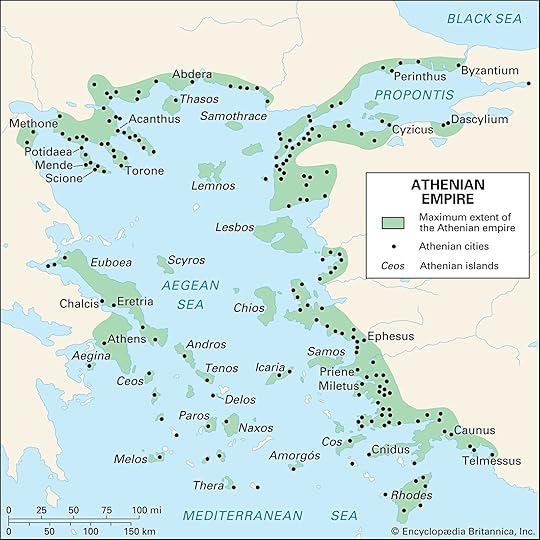The Ancient Greeks: Crucible of Civilization Episode 3 Empire of the Mind
The Ancient Greeks: Crucible of Civilization Episode 3 Empire of the Mind
PBS (2000)
Film Review
Along with the phenomenal material success of Athenian democracy (thanks to a large number of Mediterranean colonies) came a revolution in science and thinking. The Athenians now abandoned the ancient Babylonian belief that heavenly bodies were god. Instead the Greeks came to see the moon, planets and stars as inanimate bodies whose movements could be explained by reason and mathematics.

Thales is credited as the first Western scientist* to write a book on using celestial bodies in ship navigation. He also calculated the height of the Great Pyramid of Egypt by measuring its shadow at high noon. Other Athenian scientists measured the earth’s circumference and built steam engines and primitive water pumps.
This was also the era of Socrates, who the filmmakers describe as the first Western philosopher. Socrates taught critical thinking, namely that it was the responsibility of every citizen to make decisions based on what they knew to be right or good.
In 431 BC when Athens, was still the greatest power in Greece, Pericles persuaded their democratic assembly to go to war with Sparta. The latter had expanded to control all of southern Greece and, according to Pericles, posed a growing threat to Athens and the other city-states in the Delian League.
Because Sparta had a much stronger infantry (Athens had a stronger navy), Pericles’ strategy was to refuse to engage Sparta on land. He called for the Athenians to give up their farmlands, retreat behind Athens’ city walls and rely on imported foodstuffs.
After the Spartan burned all the fields around Athens, the city effectively relied on imported foodstuffs until one particular ship also brought the plague. Killing over a third of the population (including Pericles), the epidemic also caused the city-state to collapse into mob rule.
The mass execution of 13 naval officers who won a major battle against Sparta (on a trivia offense) proved a major loss to the Athens; naval force, dragging the war out over the next decade. In 413 BC Athens suffered a major defeat protecting a colony on Sicily, from which they never recovered. Sparta’s longtime ally Persian responded by blockading Athenians harbors. Their access to grain cut off, Athenians began dropping dead of starvation on the streets.
In 404 BC they surrendered to the Spartan commander Lysander, who installed the Thirty Tyrants’ reign of terror in Athens. After eight months in which roughly 5% of the population were subject to arbitrary arrest and execution and even more to property confiscation and/or exile, a popular uprising overthrew the tyrants and restored democratic rule.
The film end with the 39 9BC political trial (bought by Meleteus a private citizen serving as a voluntary prosecutor) and execution (by drinking hemlock) of the philosopher Socrates. His trial, in the public marketplace, by 501 citizens chosen by lot to be judges. The official charges against him were questioning the state religion and corrupting the youth of Athens. As neither offense was defined in Athenian law, the motivation seems to have been purely political. Socrates was notorious for publicly pointing out the wrongdoings of Athens’ political leaders and their Persian patrons.**
See Role of Persian Patrons https://larouchepub.com/eiw/public/1988/eirv15n46-19881118/eirv15n46-19881118_024-the_third_trial_of_socrates_usa.pdf
He was convinced by a small majority 280 to 221. The film includes profoundly moving excerpts from speeches Socrates gave at his trial and to friends who visited him in prison.
*The film asserts the Greeks were the first to employ celestial navigation, but the Chinese have astronomical records used in celestial navigation dating from 3000-1800 BC and the Polynesians built stick models used in celestial navigation in 1000 BC.
The Most Revolutionary Act
- Stuart Jeanne Bramhall's profile
- 11 followers



